写作中真正实用的英语语法
- 格式:doc
- 大小:47.00 KB
- 文档页数:7
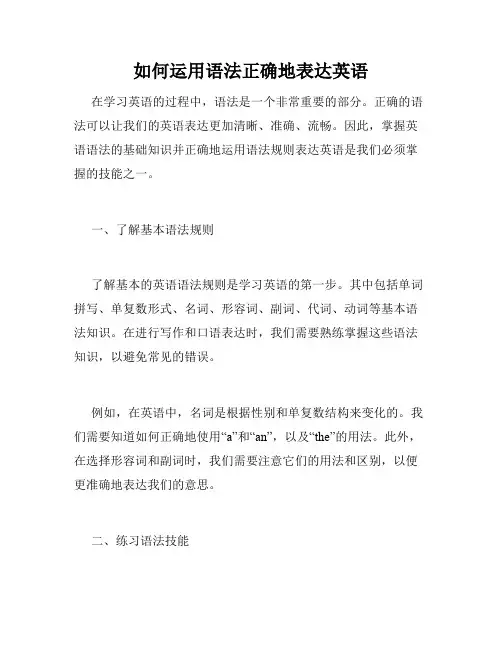
如何运用语法正确地表达英语在学习英语的过程中,语法是一个非常重要的部分。
正确的语法可以让我们的英语表达更加清晰、准确、流畅。
因此,掌握英语语法的基础知识并正确地运用语法规则表达英语是我们必须掌握的技能之一。
一、了解基本语法规则了解基本的英语语法规则是学习英语的第一步。
其中包括单词拼写、单复数形式、名词、形容词、副词、代词、动词等基本语法知识。
在进行写作和口语表达时,我们需要熟练掌握这些语法知识,以避免常见的错误。
例如,在英语中,名词是根据性别和单复数结构来变化的。
我们需要知道如何正确地使用“a”和“an”,以及“the”的用法。
此外,在选择形容词和副词时,我们需要注意它们的用法和区别,以便更准确地表达我们的意思。
二、练习语法技能“熟能生巧”,练习是提高语法技能的关键。
我们可以通过写作、朗读和听力练习来提高语法技能。
写作可以帮助我们巩固语法规则,特别是在写作过程中,我们需要思考如何使用正确的标点、语序和时态等。
朗读和听力练习可以帮助我们更加自然地掌握语音、语调和语言节奏等要素。
三、交流和互动交流和互动是学习英语的必不可少的一部分。
在与他人交流时,我们会听到不同的口音和语言风格,这有助于我们更好地了解英语表达的多样性和变化。
同时,在与他人交流时,我们会意识到自己在使用语法方面的弱点,从而有针对性地进行学习和练习。
四、借助工具借助工具,如语法书籍、词典、语法检查工具等,可以帮助我们更加高效地学习英语语法。
语法书籍可以帮助我们系统地学习语法知识,并提供一些实用的例句和练习题。
词典可以帮助我们了解单词的用法和意义,并提供一些例句和用法说明。
语法检查工具则可以帮助我们检查自己的写作和表达中是否有语法错误,并提供纠正错误的建议。
总之,正确运用英语语法是学习英语的关键。
掌握基本语法规则、练习语法技能、交流互动和借助工具都是提高英语语法能力的有效途径。
我们需要不断努力学习和练习,以便在日常生活中使用到正确的语法表达。
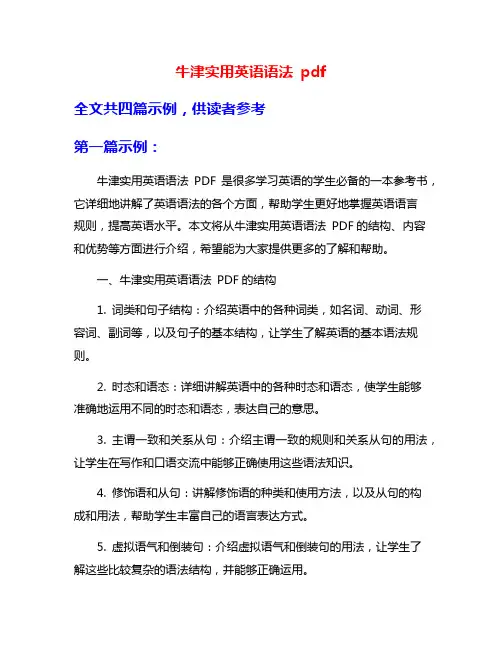
牛津实用英语语法pdf全文共四篇示例,供读者参考第一篇示例:牛津实用英语语法PDF是很多学习英语的学生必备的一本参考书,它详细地讲解了英语语法的各个方面,帮助学生更好地掌握英语语言规则,提高英语水平。
本文将从牛津实用英语语法PDF的结构、内容和优势等方面进行介绍,希望能为大家提供更多的了解和帮助。
一、牛津实用英语语法PDF的结构1. 词类和句子结构:介绍英语中的各种词类,如名词、动词、形容词、副词等,以及句子的基本结构,让学生了解英语的基本语法规则。
2. 时态和语态:详细讲解英语中的各种时态和语态,使学生能够准确地运用不同的时态和语态,表达自己的意思。
3. 主谓一致和关系从句:介绍主谓一致的规则和关系从句的用法,让学生在写作和口语交流中能够正确使用这些语法知识。
4. 修饰语和从句:讲解修饰语的种类和使用方法,以及从句的构成和用法,帮助学生丰富自己的语言表达方式。
5. 虚拟语气和倒装句:介绍虚拟语气和倒装句的用法,让学生了解这些比较复杂的语法结构,并能够正确运用。
6. 句子的连词和标点符号:教授不同种类的连词和标点符号的使用方法,使学生能够连贯地表达自己的想法,并避免语法错误。
牛津实用英语语法PDF以简洁清晰的方式介绍了英语语法的各个方面,旨在帮助学生快速地提高英语水平。
它不仅包含了基础的语法知识,还包括了一些高级的语法规则,适合各个级别的学生使用。
学生可根据自己的实际情况选择适合自己的部分进行学习,有针对性地提高自己的英语能力。
牛津实用英语语法PDF还提供了大量的例句和练习题,帮助学生巩固所学的知识,并检测自己的掌握程度。
通过反复练习,学生可以更快地掌握英语语法知识,进而应用到实际的语言交流中。
1. 结构清晰,内容丰富:牛津实用英语语法PDF的结构设计合理,内容详细全面,适合不同水平的学生使用,能够帮助他们系统地学习英语语法知识。
2. 实用性强,易于理解:牛津实用英语语法PDF注重讲解英语语法的实用性,通过简洁清晰的语言和大量的例句,帮助学生轻松理解并掌握英语语法规则。
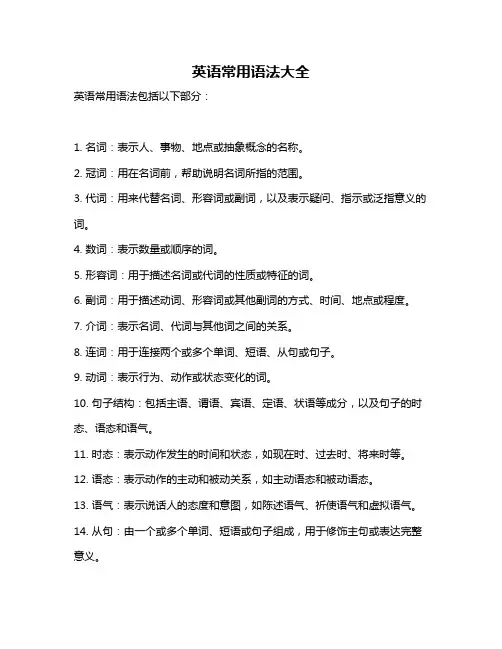
英语常用语法大全英语常用语法包括以下部分:1. 名词:表示人、事物、地点或抽象概念的名称。
2. 冠词:用在名词前,帮助说明名词所指的范围。
3. 代词:用来代替名词、形容词或副词,以及表示疑问、指示或泛指意义的词。
4. 数词:表示数量或顺序的词。
5. 形容词:用于描述名词或代词的性质或特征的词。
6. 副词:用于描述动词、形容词或其他副词的方式、时间、地点或程度。
7. 介词:表示名词、代词与其他词之间的关系。
8. 连词:用于连接两个或多个单词、短语、从句或句子。
9. 动词:表示行为、动作或状态变化的词。
10. 句子结构:包括主语、谓语、宾语、定语、状语等成分,以及句子的时态、语态和语气。
11. 时态:表示动作发生的时间和状态,如现在时、过去时、将来时等。
12. 语态:表示动作的主动和被动关系,如主动语态和被动语态。
13. 语气:表示说话人的态度和意图,如陈述语气、祈使语气和虚拟语气。
14. 从句:由一个或多个单词、短语或句子组成,用于修饰主句或表达完整意义。
15. 主从复合句:由两个或多个主从句组成,每个主从句都有自己的主语和谓语。
16. 非谓语动词:包括不定式、动名词和分词,它们可以作为句子的谓语之外的其他成分。
17. 独立主格:是一种独立于主句的句型,通常用于描述与主句相关的状态或情况。
18. 直接引语和间接引语:直接引语是直接引用别人的话,间接引语则是用自己的话转述别人的意思。
19. 倒装句:是一种特殊的句子结构,将谓语或谓语的一部分放在主语之前。
20. 强调句:用于强调句中的某个成分,通常通过改变句子结构来实现。
21. 省略句:是一种简化的句子结构,省略了某些不必要的成分,但仍能表达完整的意思。
22. 虚拟语气:表示与实际情况相反的情况或假设条件,通常与连词if或其他条件状语一起使用。
23. 定语从句:一个句子作为定语修饰名词或代词,这个句子就是定语从句。
24. 状语从句:一个句子作为状语修饰动词、形容词或副词,这个句子就是状语从句。
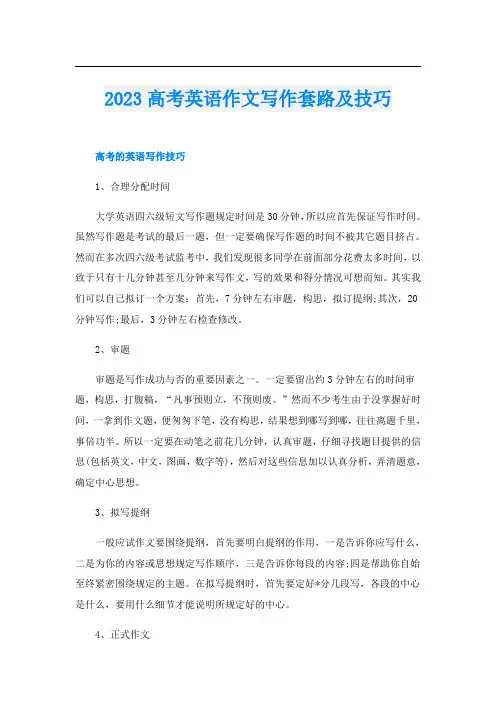
2023高考英语作文写作套路及技巧高考的英语写作技巧1、合理分配时间大学英语四六级短文写作题规定时间是30分钟,所以应首先保证写作时间。
虽然写作题是考试的最后一题,但一定要确保写作题的时间不被其它题目挤占。
然而在多次四六级考试监考中,我们发现很多同学在前面部分花费太多时间,以致于只有十几分钟甚至几分钟来写作文,写的效果和得分情况可想而知。
其实我们可以自己拟订一个方案:首先,7分钟左右审题,构思,拟订提纲;其次,20分钟写作;最后,3分钟左右检查修改。
2、审题审题是写作成功与否的重要因素之一。
一定要留出约3分钟左右的时间审题,构思,打腹稿,“凡事预则立,不预则废。
”然而不少考生由于没掌握好时间,一拿到作文题,便匆匆下笔,没有构思,结果想到哪写到哪,往往离题千里,事倍功半。
所以一定要在动笔之前花几分钟,认真审题,仔细寻找题目提供的信息(包括英文,中文,图画,数字等),然后对这些信息加以认真分析,弄清题意,确定中心思想。
3、拟写提纲一般应试作文要围绕提纲,首先要明白提纲的作用,一是告诉你应写什么,二是为你的内容或思想规定写作顺序,三是告诉你每段的内容;四是帮助你自始至终紧密围绕规定的主题。
在拟写提纲时,首先要定好*分几段写,各段的中心是什么,要用什么细节才能说明所规定好的中心。
4、正式作文在正式作文时,应按所列的提纲来进行。
写作还应注意以下几点:首先,一定要下工夫写好每一段的主题句,尤其是第一段的主题句。
A good beginning makes a good ending。
主题句能否写好关系着阅卷人对你的作文的第一印象。
高考作文是分档给分,即阅卷人根据总体印象给出某一档的分数,然后再在这一档上下进行微调。
其次,要尽量保持卷面整洁。
因为作文是人工评卷,卷面干净整洁会给阅卷人很好的印象,对提高分数档次很有好处。
然而很多考生不注意标点,语法及单词大小写,经常写了又划,划了又写,从而使卷面很糟糕而影响得分。
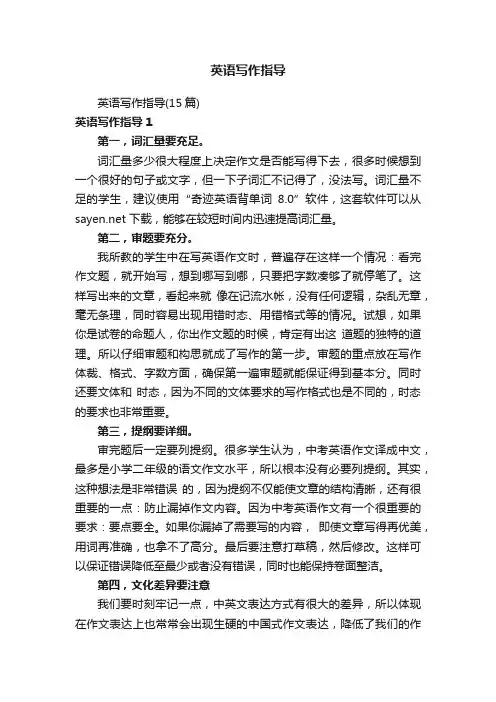
英语写作指导英语写作指导(15篇)英语写作指导1第一,词汇量要充足。
词汇量多少很大程度上决定作文是否能写得下去,很多时候想到一个很好的句子或文字,但一下子词汇不记得了,没法写。
词汇量不足的学生,建议使用“奇迹英语背单词8.0”软件,这套软件可以从 下载,能够在较短时间内迅速提高词汇量。
第二,审题要充分。
我所教的学生中在写英语作文时,普遍存在这样一个情况:看完作文题,就开始写,想到哪写到哪,只要把字数凑够了就停笔了。
这样写出来的文章,看起来就像在记流水帐,没有任何逻辑,杂乱无章,毫无条理,同时容易出现用错时态、用错格式等的情况。
试想,如果你是试卷的命题人,你出作文题的时候,肯定有出这道题的独特的道理。
所以仔细审题和构思就成了写作的第一步。
审题的重点放在写作体裁、格式、字数方面,确保第一遍审题就能保证得到基本分。
同时还要文体和时态,因为不同的文体要求的写作格式也是不同的,时态的要求也非常重要。
第三,提纲要详细。
审完题后一定要列提纲。
很多学生认为,中考英语作文译成中文,最多是小学二年级的语文作文水平,所以根本没有必要列提纲。
其实,这种想法是非常错误的,因为提纲不仅能使文章的结构清晰,还有很重要的一点:防止漏掉作文内容。
因为中考英语作文有一个很重要的要求:要点要全。
如果你漏掉了需要写的内容,即使文章写得再优美,用词再准确,也拿不了高分。
最后要注意打草稿,然后修改。
这样可以保证错误降低至最少或者没有错误,同时也能保持卷面整洁。
第四,文化差异要注意我们要时刻牢记一点,中英文表达方式有很大的差异,所以体现在作文表达上也常常会出现生硬的中国式作文表达,降低了我们的作文质量。
所以注重中英语言差异,并努力找到两者之间的表达方式上的共通点,并且有意识的运用就能避免类似的问题。
最后,细节错误要摒弃。
很多孩子在写作文时常常感觉写得非常好,用上了几个高级句型或者不错的词汇短语,以为可以得高分,但最终结果出来后却与预想差距很大。
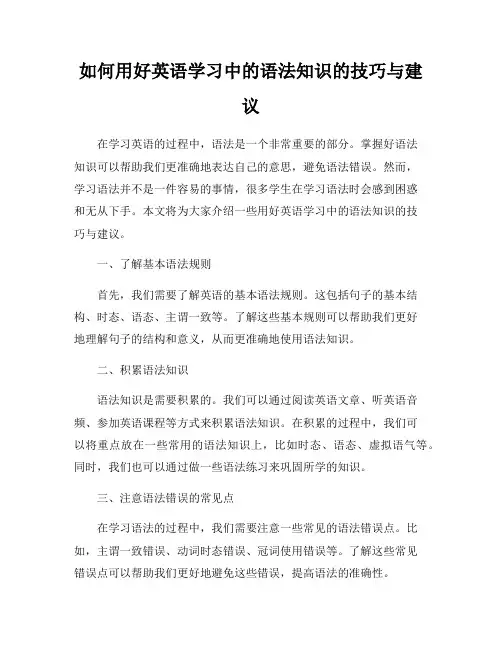
如何用好英语学习中的语法知识的技巧与建议在学习英语的过程中,语法是一个非常重要的部分。
掌握好语法知识可以帮助我们更准确地表达自己的意思,避免语法错误。
然而,学习语法并不是一件容易的事情,很多学生在学习语法时会感到困惑和无从下手。
本文将为大家介绍一些用好英语学习中的语法知识的技巧与建议。
一、了解基本语法规则首先,我们需要了解英语的基本语法规则。
这包括句子的基本结构、时态、语态、主谓一致等。
了解这些基本规则可以帮助我们更好地理解句子的结构和意义,从而更准确地使用语法知识。
二、积累语法知识语法知识是需要积累的。
我们可以通过阅读英语文章、听英语音频、参加英语课程等方式来积累语法知识。
在积累的过程中,我们可以将重点放在一些常用的语法知识上,比如时态、语态、虚拟语气等。
同时,我们也可以通过做一些语法练习来巩固所学的知识。
三、注意语法错误的常见点在学习语法的过程中,我们需要注意一些常见的语法错误点。
比如,主谓一致错误、动词时态错误、冠词使用错误等。
了解这些常见错误点可以帮助我们更好地避免这些错误,提高语法的准确性。
四、多读多写阅读和写作是提高语法水平的有效方法。
通过阅读英语文章,我们可以学习到一些常用的语法结构和表达方式。
同时,通过写作,我们可以将所学的语法知识应用到实际的写作中,从而更好地掌握语法知识。
五、多听多说听力和口语是语法运用的重要方面。
通过多听英语音频,我们可以熟悉英语的语音和语调,从而更好地理解和运用语法知识。
同时,通过多说英语,我们可以提高自己的口语表达能力,更自然地运用语法知识。
六、寻求帮助在学习语法的过程中,我们可能会遇到一些困难和问题。
这时,我们可以寻求帮助。
可以向老师、同学或者一些英语学习网站寻求帮助。
他们可以为我们解答疑惑,帮助我们更好地理解和掌握语法知识。
总之,学习语法需要一定的时间和耐心。
通过了解基本语法规则、积累语法知识、注意常见错误点、多读多写、多听多说以及寻求帮助,我们可以更好地掌握和运用语法知识,提高自己的英语水平。
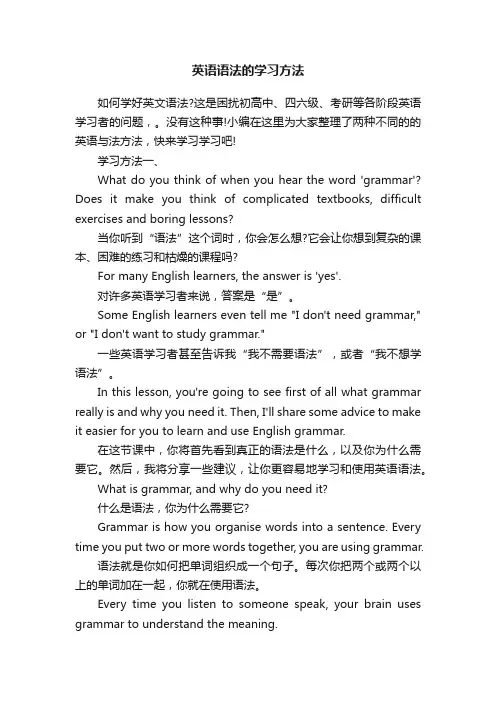
英语语法的学习方法如何学好英文语法?这是困扰初高中、四六级、考研等各阶段英语学习者的问题,。
没有这种事!小编在这里为大家整理了两种不同的的英语与法方法,快来学习学习吧!学习方法一、What do you think of when you hear the word 'grammar'? Does it make you think of complicated textbooks, difficult exercises and boring lessons?当你听到“语法”这个词时,你会怎么想?它会让你想到复杂的课本、困难的练习和枯燥的课程吗?For many English learners, the answer is 'yes'.对许多英语学习者来说,答案是“是”。
Some English learners even tell me "I don't need grammar," or "I don't want to study grammar."一些英语学习者甚至告诉我“我不需要语法”,或者“我不想学语法”。
In this lesson, you're going to see first of all what grammar really is and why you need it. Then, I'll share some advice to make it easier for you to learn and use English grammar.在这节课中,你将首先看到真正的语法是什么,以及你为什么需要它。
然后,我将分享一些建议,让你更容易地学习和使用英语语法。
What is grammar, and why do you need it?什么是语法,你为什么需要它?Grammar is how you organise words into a sentence. Every time you put two or more words together, you are using grammar.语法就是你如何把单词组织成一个句子。
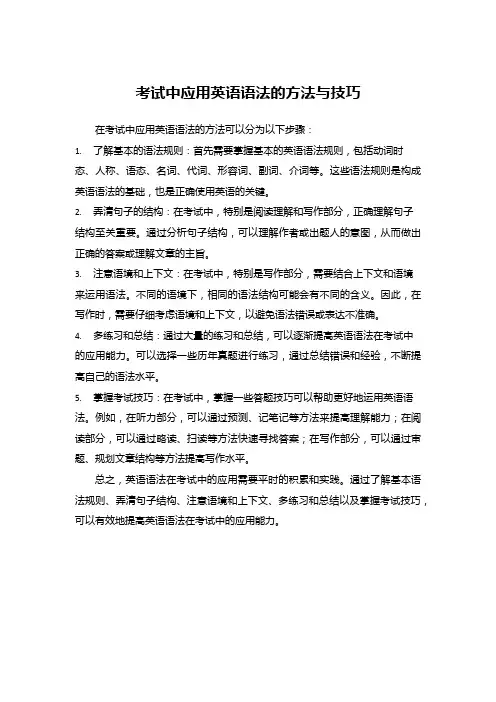
考试中应用英语语法的方法与技巧
在考试中应用英语语法的方法可以分为以下步骤:
1.了解基本的语法规则:首先需要掌握基本的英语语法规则,包括动词时态、人称、语态、名词、代词、形容词、副词、介词等。
这些语法规则是构成英语语法的基础,也是正确使用英语的关键。
2.弄清句子的结构:在考试中,特别是阅读理解和写作部分,正确理解句子
结构至关重要。
通过分析句子结构,可以理解作者或出题人的意图,从而做出正确的答案或理解文章的主旨。
3.注意语境和上下文:在考试中,特别是写作部分,需要结合上下文和语境
来运用语法。
不同的语境下,相同的语法结构可能会有不同的含义。
因此,在写作时,需要仔细考虑语境和上下文,以避免语法错误或表达不准确。
4.多练习和总结:通过大量的练习和总结,可以逐渐提高英语语法在考试中
的应用能力。
可以选择一些历年真题进行练习,通过总结错误和经验,不断提高自己的语法水平。
5.掌握考试技巧:在考试中,掌握一些答题技巧可以帮助更好地运用英语语法。
例如,在听力部分,可以通过预测、记笔记等方法来提高理解能力;在阅读部分,可以通过略读、扫读等方法快速寻找答案;在写作部分,可以通过审题、规划文章结构等方法提高写作水平。
总之,英语语法在考试中的应用需要平时的积累和实践。
通过了解基本语法规则、弄清句子结构、注意语境和上下文、多练习和总结以及掌握考试技巧,可以有效地提高英语语法在考试中的应用能力。
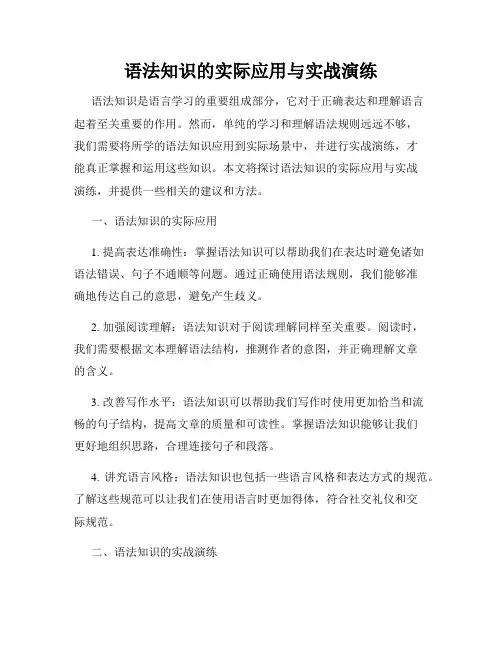
语法知识的实际应用与实战演练语法知识是语言学习的重要组成部分,它对于正确表达和理解语言起着至关重要的作用。
然而,单纯的学习和理解语法规则远远不够,我们需要将所学的语法知识应用到实际场景中,并进行实战演练,才能真正掌握和运用这些知识。
本文将探讨语法知识的实际应用与实战演练,并提供一些相关的建议和方法。
一、语法知识的实际应用1. 提高表达准确性:掌握语法知识可以帮助我们在表达时避免诸如语法错误、句子不通顺等问题。
通过正确使用语法规则,我们能够准确地传达自己的意思,避免产生歧义。
2. 加强阅读理解:语法知识对于阅读理解同样至关重要。
阅读时,我们需要根据文本理解语法结构,推测作者的意图,并正确理解文章的含义。
3. 改善写作水平:语法知识可以帮助我们写作时使用更加恰当和流畅的句子结构,提高文章的质量和可读性。
掌握语法知识能够让我们更好地组织思路,合理连接句子和段落。
4. 讲究语言风格:语法知识也包括一些语言风格和表达方式的规范。
了解这些规范可以让我们在使用语言时更加得体,符合社交礼仪和交际规范。
二、语法知识的实战演练1. 听力实践:在日常生活中,我们可以通过听力实践来加强对语法知识的应用。
收听英语广播、听音乐或观看英语电影等可以帮助我们更好地理解和运用所学的语法。
2. 阅读实习:通过阅读英语书籍、报纸、杂志等,我们可以进一步巩固语法知识的应用。
请尽量选择各种不同类型和题材的材料,以便更好地锻炼自己的语法应用能力。
3. 写作练习:写作是语法知识应用的绝佳方式。
可以通过日记、博客、论文等各种方式进行写作练习。
在写作过程中注重语法规范,逐渐形成自己的写作风格。
4. 口语交流:加入英语角、找英语外教或与朋友进行英语口语交流,这样可以在日常的口语表达中实际运用和强化所学的语法知识。
三、关于语法知识的建议和方法1. 注重基础:良好的语法知识基础非常重要。
建议通过系统学习语法知识,理解各种句子结构、语法规则和用法。
2. 多练习:语法知识需要通过实践和练习来巩固。
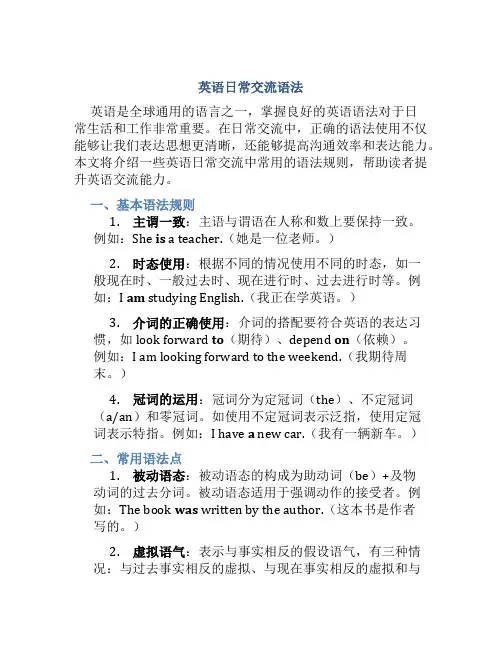
英语日常交流语法英语是全球通用的语言之一,掌握良好的英语语法对于日常生活和工作非常重要。
在日常交流中,正确的语法使用不仅能够让我们表达思想更清晰,还能够提高沟通效率和表达能力。
本文将介绍一些英语日常交流中常用的语法规则,帮助读者提升英语交流能力。
一、基本语法规则1.主谓一致:主语与谓语在人称和数上要保持一致。
例如:She is a teacher.(她是一位老师。
)2.时态使用:根据不同的情况使用不同的时态,如一般现在时、一般过去时、现在进行时、过去进行时等。
例如:I am studying English.(我正在学英语。
)3.介词的正确使用:介词的搭配要符合英语的表达习惯,如look forward to(期待)、depend on(依赖)。
例如:I am looking forward to the weekend.(我期待周末。
)4.冠词的运用:冠词分为定冠词(the)、不定冠词(a/an)和零冠词。
如使用不定冠词表示泛指,使用定冠词表示特指。
例如:I have a new car.(我有一辆新车。
)二、常用语法点1.被动语态:被动语态的构成为助动词(be)+及物动词的过去分词。
被动语态适用于强调动作的接受者。
例如:The book was written by the author.(这本书是作者写的。
)2.虚拟语气:表示与事实相反的假设语气,有三种情况:与过去事实相反的虚拟、与现在事实相反的虚拟和与将来事实相反的虚拟。
例如:If I were you, I would studyharder.(如果我是你,我会更加努力学习。
)3.倒装句:在特定情况下,主语和谓语的位置会互换,常见于疑问句、条件句和表示地点的句子中。
例如:Only in this way can we solve the problem.(只有这样我们才能解决问题。
)三、常见错误及纠正1.动词时态错误:如使用了错误的时态,应根据情况纠正。
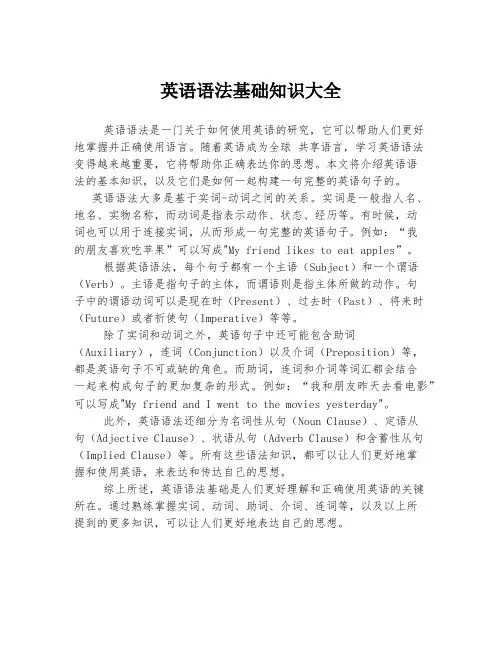
英语语法基础知识大全英语语法是一门关于如何使用英语的研究,它可以帮助人们更好地掌握并正确使用语言。
随着英语成为全球共享语言,学习英语语法变得越来越重要,它将帮助你正确表达你的思想。
本文将介绍英语语法的基本知识,以及它们是如何一起构建一句完整的英语句子的。
英语语法大多是基于实词-动词之间的关系。
实词是一般指人名、地名、实物名称,而动词是指表示动作、状态、经历等。
有时候,动词也可以用于连接实词,从而形成一句完整的英语句子。
例如:“我的朋友喜欢吃苹果”可以写成"My friend likes to eat apples”。
根据英语语法,每个句子都有一个主语(Subject)和一个谓语(Verb)。
主语是指句子的主体,而谓语则是指主体所做的动作。
句子中的谓语动词可以是现在时(Present)、过去时(Past)、将来时(Future)或者祈使句(Imperative)等等。
除了实词和动词之外,英语句子中还可能包含助词(Auxiliary),连词(Conjunction)以及介词(Preposition)等,都是英语句子不可或缺的角色。
而助词,连词和介词等词汇都会结合一起来构成句子的更加复杂的形式。
例如:“我和朋友昨天去看电影”可以写成"My friend and I went to the movies yesterday"。
此外,英语语法还细分为名词性从句(Noun Clause)、定语从句(Adjective Clause)、状语从句(Adverb Clause)和含蓄性从句(Implied Clause)等。
所有这些语法知识,都可以让人们更好地掌握和使用英语,来表达和传达自己的思想。
综上所述,英语语法基础是人们更好理解和正确使用英语的关键所在。
通过熟练掌握实词、动词、助词、介词、连词等,以及以上所提到的更多知识,可以让人们更好地表达自己的思想。
英语语法实用大全1. I am eating an apple.(现在进行时)2. She has eaten lunch.(现在完成时)3. They were playing football yesterday.(过去进行时)4. We have played tennis for two hours.(现在完成进行时)5. He will visit his grandparents tomorrow.(一般将来时)6. I would like to drink some water.(过去将来时)7. The teacher told us to finish our homework.(被动语态)8. She is a doctor.(职业表达)9. They live in a big house.(居住地点表达)10. I like swimming.(兴趣爱好表达)11. He goes to school by bus.(出行方式表达)12. She is reading a book.(正在进行的动作表达)13. We have been to Beijing twice.(去过的地方表达)14. They are going to the movies tonight.(计划做某事的表达)15. I can speak English.(能力表达)16. She is taller than me.(比较级表达)17. The weather is getting colder.(进行中的变化表达)18. He has been studying for three hours.(持续时间的表达)19. They didn't go to the party because they were busy.(原因表达)20. I would rather stay at home than go out.(比较级的特殊用法)21. If I had more money, I would buy a new car.(虚拟语气)22. Although she is tired, she continues to work.(尽管的表达)23. Not only did he study hard, but also he helped others.(不仅而且的表达)24. While I was sleeping, someone knocked on the door.(当的表达)25. Since he left, I haven't heard from him.(自从的表达)26. Before I go to bed, I usually read a book.(在之前的表达)27. After she finishes her work, she goes home.(在之后的表达)28. As soon as I arrive home, I take a shower.(一就的表达)29. The more you practice, the better you become.(越越的表达)30. Where do you want to go for vacation?(地点疑问词)31. Why did you come late?(原因疑问词)32. How old are you?(年龄疑问词)33. What time does the movie start?(时间疑问词)34. Who is your favorite teacher?(人物疑问词)35. Which book do you want to read?(选择疑问词)36. Is there a bank near here?(存在句)37. Can you help me with this problem?(请求帮助)38. May I use your phone?(请求许可)39. Should we go to the party tonight?(提供建议)40. Have you ever been to Paris?(经历询问)41. I'm going to study abroad next year.(将来计划)42. She is working on her thesis.(现在进行的工作)43. They have already finished the project.(完成的任务)44. We need to buy some milk.(需求表达)45. He was late because of traffic.(解释原因)46. I would like to order a pizza.(点餐用语)47. She is good at singing.(擅长做某事)48. They enjoy playing video games.(喜欢做某事)49. We are planning to go on a vacation next month.(计划做某事)50. I try to exercise every day.(努力做某事)。
【#英语资源# 导语】英语是全球使用范围最广的一门语言,也是国际上通用的语言,在当今英语是一门不错的一门学科,如果你想学好英语,会读英语会写英语那是远远不够的,就像你会读中文写中文一样,不会用它来组成一句完整的话,英语的音标就像中文的拼音一样,那自然英语的语法就像中文的语法一样,我们都是中国人都会说中文,那自然中文的语法就不用说了,那今天我们就谈谈英语的语法吧!下面是?无忧考网整理的内容,希望对你们有帮助!1.英语语法归纳总结一、关系代词引导的定语从句1、that 指人或物在从句中作主语,宾语或表语which 指物在从句中作主语,宾语或表语(作宾语时可以省略)who 指人在从句中作主语,宾语或表语whom 指人在从句中作宾语whose 指人或物在从句中作定语as 指人或物在从句中作主语,宾语或表语but 指人或物在从句中作主语,宾语或表语注意:指物时,whose+名词=the+名词+of which或 of which+the+名词2、as 的用法(1)常用于下列结构:such…as; so…as;the same…as; as…as注意:the same…as 表示同一类,不同一个the same…that 表示同一个(2)as与which的区别a、位置不同as可放在主句后,主句前或主句中间;which只能放在主句后。
b、as起连接作用,表达说话人的观点、看法,并指出主句内容的根据或出处,意为“正如,正像”。
Which相当于并列句,可以用and this来代替,意为“这一点,这件事’”。
注意:as常用于下列结构:as we know/ as is known to all, as we all can see, as has been said before/above,as might be excepted, as is often the case, 一般不能用which代替as。
c、在从句中作主语时,which既可作系动词be的主语也可作实义动词的主语,而as只可作系动词be的主语。
学习英语时如何运用语法知识解决实际问题在学习英语的过程中,语法知识是非常重要的一部分。
掌握好语法知识可以帮助我们更好地理解和运用英语,从而解决实际问题。
本文将从几个方面探讨如何运用语法知识解决实际问题。
一、理解句子结构句子是语言的基本单位,了解句子的结构对于正确理解句子的意思至关重要。
在学习英语语法时,我们需要掌握主谓宾结构、定语从句、状语从句等基本句型。
通过分析句子的结构,我们可以更准确地理解句子的含义,从而解决实际问题。
例如,当我们阅读一篇英语文章时,遇到一个复杂的句子,我们可以通过分析句子的结构来理解句子的意思。
如果我们能够正确地识别出主谓宾结构和定语从句,就能够更好地理解句子的含义。
二、掌握时态和语态时态和语态是语法中的重要概念,掌握好时态和语态的用法可以帮助我们更准确地表达自己的意思。
在实际应用中,我们经常会遇到需要描述过去的事情、现在正在进行的动作以及将来要发生的事件。
掌握好时态的用法可以帮助我们正确地表达这些概念。
另外,语态也是解决实际问题的重要工具。
通过使用主动语态和被动语态,我们可以更好地强调动作的执行者或承受者。
在写作或口语表达中,我们可以根据需要选择适当的语态,使句子更加准确、生动。
三、运用语法知识解决疑惑在学习英语的过程中,我们经常会遇到一些语法疑惑,比如动词的不规则变化、形容词和副词的比较级和最高级等。
这时,我们可以通过查阅语法书籍或咨询老师来解决这些问题。
另外,互联网的发展也给我们提供了很多解决问题的途径。
我们可以通过搜索引擎查找相关的语法问题,并参考权威的语法网站或博客来获取答案。
但是需要注意的是,我们要选择可信度高的来源,避免误导。
四、运用语法知识提高写作能力语法知识对于提高写作能力也是至关重要的。
掌握好语法知识可以帮助我们写出更准确、流畅的句子。
在写作中,我们可以运用语法知识来构建复杂句子、使用适当的连接词和标点符号等,使文章更具逻辑性和条理性。
此外,语法知识还可以帮助我们避免一些常见的语法错误,比如主谓一致、时态混乱等。
英语语法与写作技巧
一、英语语法的重要性
1.语法基础扎实,提高英语水平的关键
2.语法学习与实际应用相结合
3.英语语法在写作中的作用
二、英语写作技巧的提升
1.句子结构的多样性
2.词汇的丰富性
3.段落结构的合理性
4.逻辑关系的清晰性
三、实用英语写作策略
1.掌握写作的基本步骤
2.拟定大纲,明确主题
3.素材积累与整理
4.初稿撰写与修改
5.定稿审查与完善
四、英语写作中的常见问题及解决方法
1.语法错误
2.拼写错误
3.标点符号使用不当
4.句子冗长或过于简单
5.缺乏逻辑连接词
6.文化差异导致的表达不当
五、优秀英语写作的必备要素
1.内容丰富,有深度
2.结构清晰,层次分明
3.语言优美,表达流畅
4.逻辑严谨,论证充分
5.符合文体规范和格式要求
六、总结
1.英语语法与写作技巧的关系
2.提升英语写作能力的途径
3.持续练习与积累的重要性
4.信心与毅力,迈向优秀英语写作水平
在当今全球化的时代,英语作为国际交流的主要语言,其重要性不言而喻。
英语语法与写作技巧是英语学习的核心部分,掌握这两方面,有助于提高我们的英语水平,更好地应对各种英语考试和实际应用场景。
通过以上六个方面的探讨,相信大家对英语语法与写作技巧有了更深入的了解。
只要我们付出努力,不断练习与积累,相信每个人都能取得优秀的英语写作能力,为个人的发展和国际交流打下坚实基础。
. '. 第三节 写作中真正实用的英语语法
据考证,“语法”一词源于希腊语“Grammatike”,意指体现于写作过程中的“文字的技巧”,它是语言运用的规则,构建句子的框架,遣词造句的黏合剂,也是英语各项技能的基础,尤其在写作过程中起着举足轻重的作用。 但四、六级考试改革中对语法题目的减少使很多人误以为语法的地位被削弱,加之近年来重视综合技能的各类语言理论的出现,使得一部分考生在写作复习过程中完全摈弃对语法部分的准备,久而久之,形成了“轻语法,重语感”的习惯。而另一部分考生则缺乏必要的语法运用能力,他们可以准确解答语法题目,却不能在作文中灵活运用语法写出漂亮句子。这些考生文章的共同特点就是只有其意,不见其形。 语言是思维的外衣,准确的语法是高分作文的重要必备条件。如果考生能在写作中娴熟地运用语法技巧,就可以使文章逻辑严密,形神兼备。 鉴于语法体系庞大繁杂而备考时间有限,此节内容无法涵盖整个语法体系,只能选择写作中出现频率较高的语法进行重点讲解,如状语前置、倒装、虚拟语气、强调句等,并辅以例句讲解,希望能够帮助考生扫除写作中的语法障碍,轻松闯关。
状语前置 一般而言,英语句子中,状语成分的位置是可前可后的。但状语的前置是六级作文中常用的句式。所谓状语前置,就是把修饰动词的状语结构,如分词短语,. '. 介词短语,动词不定式结构等放到句首。 这一句式的最大优点就是断句自然,让单调的句子有跳跃的节奏感。请看下面句子: 1) With the expansion of industrialization, requirement for energy all over the world is on the rise.(随着工业化进程的发展,全世界的能源需求都在增加。) 2)Once lushly forested, this region has seen more than 80% of its original vegetation cut down or burned. (这个地区曾经丛林密布,但现在80% 的原生植被被砍伐或焚烧。) 3)To reach millions of people who watch television, advertisers are willing to pay big money. (为了能抓住千千万万的电视观众,广告商们不惜花费巨额资金。) 在以上例句中,状语的前置使得句子结构分明,避免了后置的平庸化,尤其是第二个句子中的状语部分,既简洁又有力,本身就是一个出彩的表达,如果放置到句尾就不会出现这种效果了。而第三句中不定式目的状语的前置还在一定程度上起到了强调的作用。
倒装 倒装又分为全部倒装和部分倒装。全部倒装是指将句子中的谓语动词全部置于主语之前。部分倒装是指将谓语的一部分如助动词或情态动词置于主语之前。如果句中的谓语没有助动词或情态动词,则需添加助动词do, does或did等,并将其置于主语之前。倒装的作用是为了强调或平衡句子结构。 倒装本身是较复杂的高级结构,如果在六级写作中能加以正确运用,就特别能打动阅卷老师。最重要的是,倒装句所表达出来的意思较普通句式更精彩,也. '. 更有分量。 具有否定意义的词或短语置于句首时(除否定词修饰主语外),句子一般要写成部分倒装句。这类词或短语常见的有:not, never, seldom, hardly, rarely, scarcely, by no means, under no circumstances, in no way, at no time, no sooner … (than), hardly … (when), not only … (but also), not until… ,等。例如: 1) By no means are they satisfied with their present income. (他们对目前的收入一点也不满意。) 2) On no account should we just pursue the economic benefits without any regard to our environment. (我们决不能仅仅追求经济效益而毫不顾及环境。)
全部倒装则需要把整个谓语放在主语的前面去而构成倒装语序。如: 3)People have different personality types, and connected to these types are different learning styles. (人们有着不同的个性类型,而与此类型相连的是不同的学习方式。) 倒装常见形式还有:一,as引导的让步状语从句有时也会用倒装,如Inexperienced as we are, we can fling ourselves into our work body and soul. (尽管缺乏经验,但我们会全身心地投入到工作中去。) 二,“only+状语”位于句首时, 用部分倒装。这是很多考生喜欢使用的句式,如:Only in this way can we become fully developed individuals. (只有这样,我们才能成为全面发展的个体。) 三,so...that结构中,有时要强调so所修饰的形容词或副词,常将so 连同它所修饰的形容词或副词一起提前放在句首。如: So serious was the problem that it aroused wide-ranging attention of the general public. (这个问题如此严重,引起了公众的广泛关注。) 四,省略了if的虚拟条件句、某些表示祝愿的句子、以及某些让步状语从句,等等也要用倒装句式。May your company become prosperous.祝贵公司生. '. 意兴隆!(尤其常见于应用书信文体类题目中)。 另外,在想强调地点时可以把地点状语放在句首,后面用主谓倒装。这样做的好处之一是倒装后把真正的主语放到了句子的末尾,后面还可以继续加从句。如:Along outside of the front fence ran the country road, which is usually dusty in the summer time. (篱笆外面是一条乡村路,夏季常常满是尘土。)
从句 从句的种类很多,这里概括地谈一下在写作时从句起到的作用:首先,从句可以使句子和句子间的关系更加紧密,更好地表现上下文的关联性和文章的整体性。其次,句子的结构和逻辑关系会通过从句的引导词或连接词较清楚地展现出来。再次,可以使写作中出现长短不一的句式,丰富文章的形式。如: 1)As paper is biodegradable, it does not pose as much threat to the environment when it is discarded (纸张是可生物降解的,所以当我们把它扔掉的时候,它不会对环境造成很大的威胁。)
2) While people may refer to television for up-to-minute news, it is unlikely that television will replace the newspaper completely. (人们可能更喜欢从电视上获得最新消息,但是电视不可能完全取代报纸。) 3)Unless effective solutions are worked out, the problem of pollution will eventually get out of hand. (除非制定出解决问题的有效办法,否则污染问题将难以控制。)
虚拟语气 虚拟语气让不少考生感到头疼不已,它的多种形式,尤其是混杂时态的虚拟. '. 句使得他们望而却步,不敢在写作中进行尝试,害怕由于误用而出现适得其反的作用;但是,反言之,如果一旦考生写出漂亮的虚拟语气的句子,也可以因为扎实的语法基础而为作文提分。 虚拟语气在非真实条件句中的应用相对要容易点,可以表示过去,现在和将来的情况。考生需要记住这三种不同的情形的基本特点是时态退后: 同现在事实相反的假设,条件从句用一般过去时;主句用should( would) +动词原形;同过去事实相反的假设,条件从句用过去完成时,主句用should(would) have+ 过去分词;与将来事实相反,条件从句用一般过去式或were to…或should+动词原形,主句用should( would) +动词原形。 这里主要强调比较复杂,比较特殊的虚拟语气在写作中的运用。 一,混合条件句 由于主句与从句的动作发生在不同的时间,这时主、从句谓语动词的虚拟语气形式因时间不同而不同。如: If we human beings hadn’t destroyed the balance of ecology, we would live in a world with abundant species of wild life today. (如果我们人类没有破坏掉生态平衡,那么今天我们所生存的世界仍然会有大量的野生生物物种。) 二,It is demanded / necessary / a pity + that…结构中的主语从句的谓语动词要用should 加动词原形, should 可省略。如: It is necessary that we channel our energy not only into study but into fostering other abilities at college. (在大学里,我们既要把精力放在学习上,也要放到其它
能力的培养上。) 三,在在表示命令、建议、要求等一类动词后面的宾语从句中,如order, suggest, propose, require, demand, request, insist, command, insist +